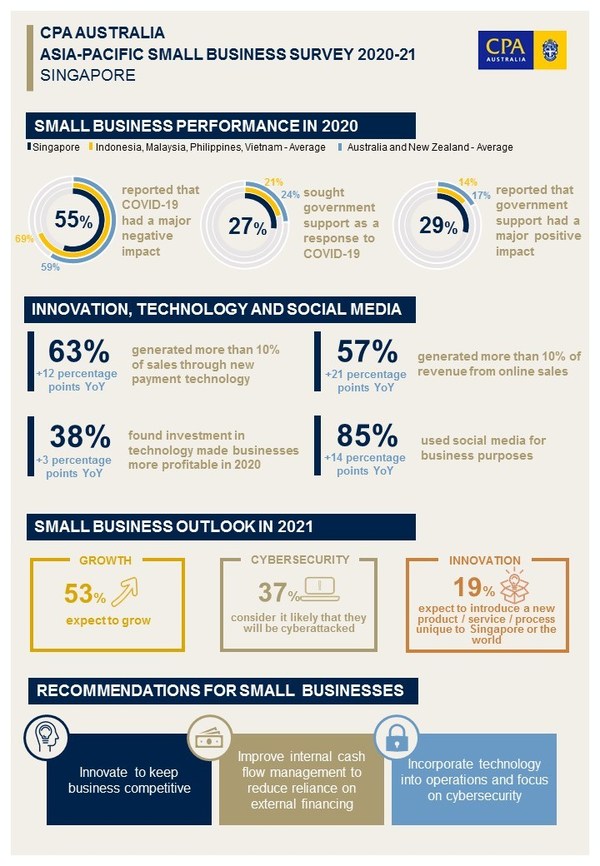SINGAPORE, March 30, 2021 /PRNewswire/ — Although times were tough for Singapore’s small businesses last year due to COVID-19, local companies were less impacted than their counterparts in Southeast Asia, according to global professional accounting body CPA Australia.
Small businesses in Singapore were also most likely to report that government support or incentives had a positive influence on their businesses and accessed such measures last year.
These are among the new findings from CPA Australia’s annual survey of small businesses in 11 Asia-Pacific markets, including Singapore.
According to the survey, 55 per cent of Singapore’s small businesses said the pandemic had impacted them adversely. However, this figure is lower than for small businesses in Malaysia (67 per cent), Vietnam (81 per cent) and Indonesia (68 per cent).
Twenty-nine per cent of Singapore’s small businesses said government support had a positive influence on their businesses in 2020, while 27 per cent sought government support as a major response to COVID-19.

“The data suggests that the combination of fiscal, monetary and other measures, mounted by the Singapore government in response to COVID-19, helped small businesses navigate the worst recession that the country has faced in over 50 years and cushioned businesses from the worst of the impact,” said Mr Max Loh, CPA Australia’s Singapore Divisional President.
In 2020, the government injected approximately S$100 billion in stimulus measures to support local enterprises and the economy, while striving to save jobs.
More than half (53 per cent) of small businesses in Singapore are optimistic about their growth prospects in 2021 compared with counterparts in developed markets like Hong Kong (21.2 per cent), Australia (41.4 per cent) and New Zealand (44 per cent).
Singapore’s small businesses are planning to increase their focus on innovation this year. Nearly 19 per cent say they will introduce a new product, process or service that is unique to their market or the world in 2021, compared with 13.4 per cent last year and 13.9 per cent in 2019.
“Innovation is likely to result in business growth especially in an increasingly competitive and disruptive business environment. Small businesses will do well to continuously improve their product offerings, customer service or accessibility in order to thrive,” said Mr Loh.
Amid the pandemic, many small businesses adopted new ways of working by leveraging technology to support their business operations.
More than eight in ten (84.6 per cent) small businesses in Singapore used social media to promote their business last year, compared with 71.2 per cent in 2019. Only a quarter of businesses surveyed did not earn any revenue from online sales in 2020, down from 39 per cent in 2019.
Singapore’s small businesses also hastened their adoption of new digital payment technologies. More than eight in ten (84.8 per cent) received payment through platforms such as Grabpay, Dash, Pay Lah in 2020, up from 70.6 per cent in 2019.
Profit is helping to drive this focus on technology. Over 38 per cent of small businesses that invested in technology in 2020 reported these investments were already profitable, up from 35.1 per cent in 2019.
There is a growing awareness of cyber risks among Singapore’s small businesses. Nearly four in ten (39.5 per cent) reviewed their cybersecurity defences in the past six months and 36.5 per cent expect the possibility of a cyber-attack on their business this year, up from 29.5 per cent in 2020.
“The focus on technology is one factor that should support the recovery and long-term growth of Singapore’s small businesses. Contributing to this positive trend is Singapore’s excellent technology infrastructure and support for digital adoption given by the government to small businesses. Yet, with greater digitalisation, the risk of cyber-attacks increases. Managing cyber risks will help small businesses protect their operations and customers’ data, and importantly, build trust and reputation,” said Mr Loh.
The annual survey polled 4,227 small businesses in 11 Asia-Pacific markets, with 307 respondents from Singapore.
CPA Australia recommends Singapore small businesses consider the following measures:
- Consult a trusted professional adviser to improve recovery and growth prospects.
- Innovate to ensure business remains competitive.
- Improve internal cashflow management to reduce reliance on external financing.
- Incorporate technology into business operations.
- Make cyber-security a focus.










